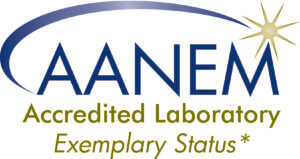EMG & Peripheral Nerve Evaluation Lab
Exemplary Status Accredited by the American Association of Neuromuscular and Electrodiagnostic Medicine (AANEM)
Our doctors and technologists perform nerve conduction studies, needle EMG, single-fiber electromyography (SFEMG), and other specialized procedures at the EMG Laboratory. Your primary care physician may order you to have an EMG to help diagnose disorders such as carpal tunnel, ALS (or Lou Gehrig disease), muscular dystrophies and other nerve and/or muscle disorders.
About EMG
Electromyography (EMG) is a clinical test to assess the health of your muscles and the nerve cells that control them. An EMG can help reveal muscle and/or nerve dysfunction or any problems with nerve-to-muscle signal transmission. Typically, specialized EMG tests are needed to diagnose certain disorders.
What you can expect
Prior to the test, you will receive a physical examination by our physician. For the test, surface electrodes, small wires or needles will transmit a tiny electrical current through selected muscles to evaluate electrical activity associated with movement and rest of your muscle. Minor discomfort, such as twinges or spasms may occur, however our experienced staff will help minimize discomfort. A typical test will take about 45-60 minutes and will be composed of two parts.
Admissions
Referrals are needed for EMG testing or neuromuscular evaluations from your primary care doctor.
